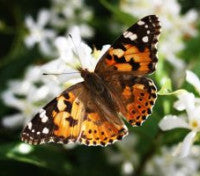HTA urges gardeners to make their gardens more wildlife friendly
HTA urges g ardeners to make their gardens more wildlife friendly
ardeners to make their gardens more wildlife friendly
The HTA are encouraging the UK public to turn their gardens into wildlife havens to save the country's pollinating insects.
"Bees, Butterflies and Blooms, the first episode of a new TV series, was broadcast on BBC Two at 8pm last night and highlights the decline in the number of pollinators who are vital to the production of the vast majority of the fruits and vegetables we need in our healthy 5-a-day diets.
Research has shown that more than three quarters of Britain's butterfly species have declined in the past 20 years1 and Britain's wildflower meadows and grasslands have also declined by 98 per cent. These are worrying figures and the HTA are offering consumers planting advice to attract pollinating insects to their gardens as they are crucial to British wildlife and the economy.
The recent HTA PlantforLife Environment report revealed that one in three people are now doing things specifically to encourage wildlife into the garden - which is an increase of a third compared to four years ago. Also, a survey by Ipsos Mori, commissioned by the HTA revealed that 75% of garden owners agree or strongly agree with the statement "It's important to me that my garden supports wildlife like birds and bees".
Whatever type of garden you have, it is extremely easy to create an environment for insects and protect their survival. Nectar rich flowers such as Buddleja, Foxgloves, Honeysuckle, Cornflowers, Lavender and Sedum provide a food source for pollinating insects, butterflies and bees. They look wonderful when in full bloom and are easy to find in nurseries and garden centres.
Insects are attracted to bright and soft colours so having a mixture of these and nectar rich plants will encourage them to keep coming back to your garden year after year. Insects such as bees will also benefit from some artificial shelter and there is a wide range of bug homes and boxes you can buy for your garden or alternatively make for yourself.
Andrew Maxted, Director of Marketing and Communications at the HTA said: "Insects play an important part in our gardens and a third of all the food we eat is on our table thanks to insects pollinating our crops. Gardeners can help reduce their decline by encouraging wildlife into their gardens by growing a wide range of bee and butterfly friendly plants and become part of the solution."
To educate and provide gardening advice about ways in which people can help - the HTA's PlantforLife initiative has published information on how to encourage and keep insects in your garden which can be found at www.plantforlife.info
Statistics on UK butterfly decline provided by The Butterfly Conservation
Contacts
Gill Ormrod, Angela Bean or Cassie King
HTA Media Office
Tel: 0118 930 3132
Email: media.office@the-hta.org.uk
